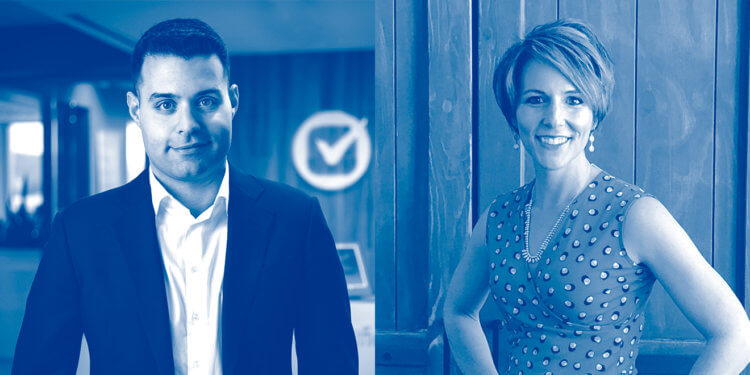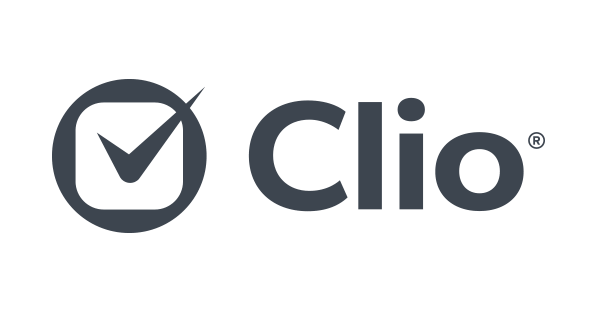

About the episode:
Data is everywhere, and the power of data analysis is coming to law firms too.
With advancements in data collection, data analysis, and business intelligence tools, many organizations now have the tools they need make more data-driven decisions—but many law firms aren’t taking advantage.
We speak with Billie Tarascio, owner of Modern Law, and George Psiharis, COO at Clio, about why many law firms have been slow to start using data to make better business decisions—and about the benefits for firms that are data-driven.
Billie’s seen plenty of positive changes at her firm since she started using data to guide her decision making, and both her and George shared plenty of tips for firms just starting out on their own data-driven journeys.
Our Guests:

George Psiharis
George Psiharis is the Chief Operating Officer at Clio. Specializing in strategic partnerships, data analytics and customer development, George has worked extensively with law schools, bar associations, and other legal professionals to help make information on cloud computing and law firm economics increasingly accessible.

Billie Tarascio
Billie Tarascio is a family law attorney and the owner of Modern Law and Modern Law Practice in Phoenix, Arizona. She spends her time managing and growing her firm and others’ firms using data and best practices for all aspects of law firms. She is the Author of “Decode Your Divorce” and co -author of “Tiger Tactics, Powerful Strategies for Winning Law Firms”.
Host bios:

Teresa Matich
Teresa Matich is the Content Strategist at Clio, where she’s responsible for educating the legal industry on market trends, best practices, and important issues impacting law firms. In her spare time, she enjoys traveling, snowboarding, and traveling to snowboard. Email her at [email protected] or tweet her at @TeresaMatich.

Andrew Booth
Andrew Booth works within the Business Operations department at Clio as the Learning Media Specialist. He is best known as the voice (and sometimes face) of Clio’s training videos, and the voice and tweets behind the @JackNewtonsShoe Twitter account. Andrew received his Broadcast Communications degree from BCIT, and has produced work for such broadcasting outlets as Global News and Roundhouse Radio. Email him at [email protected] or tweet him at @JackNewtonsShoe.

Derek Bolen
Derek Bolen is the Senior Manager of Customer Marketing at Clio, which means he gets paid to build relationships with the greatest customers in the world. When he isn’t working, he’s tweeting, reading, writing, podcasting, running, obsessing over fantasy football, or hanging out with his 6 year old son. Email him at [email protected], or tweet him at @hurrrdurrr.
Show notes
- Billie talks about the value of taking a data-driven approach to running a law firm
- Introduction
- Billie talks about the challenges of being data-driven
- George defines what it means to be data-literate
- Billie speaks about what happened when her firm started paying attention to the data
- George speaks about the Legal Trends Report
- George talks about what sort of data law firms could be tracking
- Billie talks about what she tracks at her law firm
- George talks about key metrics like response time to potential clients George and Steve talk about referrals
- Conclusion
Transcript
Read full transcript
Billie: I was struggling with growth. My firm felt really busy, we had a lot of clients, I had a good number of employees.
Andrew: That’s Billie Tarascio, owner of Modern Law.
Billie: And I didn’t really understand why I felt busy, because I was only making a certain amount of money.
Andrew: She’s seen incredible growth at her firm by taking a data-driven approach, and she thinks there’s a lot of opportunity for other law firms willing to take this approach on, as well.
Billie: And, turning to data and really understanding data helped create that predictability and certainty, and really helped me make decisions as a law firm owner.
Teresa: I’m Teresa Matich.
Andrew: And I’m Andrew Booth. And this is Matters. Matters is a podcast presented by Clio, the world’s leading cloud-based legal technology provider, where we look at small changes that can make a big impact to your daily life and practice. In today’s episode, we will be talking about data literacy and why it matters.
Big data is everywhere, and it’s coming to law firms too. With advancements in data collection, data analysis, and business intelligence tools, many organizations, including law firms, now have the resources they need to make informed decisions.
Teresa: It all starts with becoming what is often defined as being data literate, which means not only tracking key metrics, but also, keeping an open mind about what the data tells you. For Billie, paying attention to the data has made all the difference. Data literacy helped her uncover the metrics she needed to measure and track to make her firm successful.
Andrew: As Billie explains, many lawyers check a lot of boxes when opening their firms, but sometimes, they don’t ask the right questions about how to run a business. And that typically means a lot of opportunity gets left on the table.
Billie: I feel like, in general, solos and small firms, which dominate the legal industry, are mostly disaggregated and flying blind. And we are all in the same position where we reinvent the wheel every time a solo practice is opened, or a small firm, or small partnership, is formed. Everyone then scrambles to do a little bit of research, which usually involves, “Here are the tech tools you need,” and that does not tell you how to run a law firm. So, you don’t know at that point, “How do I really make sure that I’m getting clients?” There’s a lot of information on marketing, but, how do I treat those leads once they get to me? What’s the best practice for who should be answering my phones and what I should be saying to people? And then, what data should I be collecting in those initial calls? Is there a magic number, or are we all just guessing? That’s the opportunity, the opportunity is for us to collectively do a better job so that we can serve clients better.
Andrew: So, if you ask the right questions and go with the data, rather than going with your gut, you’ll set yourself up to make well-informed business decisions to help your firm succeed. But, getting curious about facts and figures is just the first step towards becoming data literate.
Teresa: When you want to start digging into data and setting goals for yourself, where do you even begin? What are you benchmarking against? What tools exist in legal that will help you on the path towards data literacy? Who better to speak to on this topic than Clio’s very own Chief Operating Office, George Psiharis. We wanted to get George’s opinion on what it means to be data literate.
George: Data literacy is a great term and one that’s tossed around a lot. I think really, on some level, in just means that you know how to look at facts and charts and interpret them, but to me, it means a couple of very specific things in a law firm practice, or even broader business context. The first thing it means to me is that you are fact-driven, right? Which, I think in general, in legal practice, most folks are. A big part of the job is looking at the facts and presenting them in different forms, whether that’s to a client, whether that’s to opposing counsel or a judge as part of something that goes to court. But really, when you’re thinking about yourself or your business and your legal practice, it’s very easy to judge my instinct, right, and run by gut, and experience, which are super important and cannot be overlooked.
The thing about data is that once you compile it and look at it, it can surprise you, and that act of knowing how to count it, knowing how to look at it, really is the key element to me of data literacy. The second big piece of being data literate to me is being outcome-oriented. So, one of my old mantras that I’ve learned from mentors is to never mistake motion for progress, especially in a solo or small firm practice area, but I think overall, it’s very easy to feel exceptionally busy, but not be making a dent toward things that we know that we care about and have set for goals as ourselves. And the only way you can know if you’re making it, is by setting these outcomes in the first place and then understanding how you can benchmark yourself against achieving them. And, in doing so, I think you have the qualities of being what we describe as data literate.
Andrew: When Billie started measuring her firm’s performance against specific targets, it became harder to ignore blind spots and easier to pinpoint and dig into potential issues and find solutions.
Billie: It was much easier to hide before we started publicly reporting metrics, and discussing them. So, this is not a punitive thing, this is a “how do we discover what’s happening, and then make changes based on data?” So, there’s nowhere to hide, and you can’t subjectively say, “Oh, you know, I didn’t have enough clients,” or, “The quality of the clients were really bad this month,” or whatever. We know that our conversion rate should be x, so there’s no—if that’s changed, we need to really dig in and figure out why.
Andrew: So, data literacy means setting fact-driven, outcome-oriented goals, and taking a pragmatic, fact-based look at what’s happening when performance doesn’t measure up. But, it’s also important to be aware of the sheer amount of data available that could help you inform business decisions, so that you have an understanding of all the resources that you have available. Companies are starting to get creative about how they dig into and present this data. For example, George saw an opportunity to use anonymized and aggregated data from Clio to provide insights into industry benchmarks for lawyers, in the form of the Legal Trends Report.
George: Several years ago, we chose to put together a document called The Legal Trends Report, which we publish every year and unveil at our annual user conference, which we call the Clio Cloud Conference, and in doing so we are seeking to share some of the insights that we know we’re able to unpack and review with the legal profession. One of the cool things about Clio as we’ve grown is that we have more customers using the same billing platform and practice management system than anyone has ever had in legal. So, we’re in this unique position where we can report back to the profession on trends of what’s going on for things like billable rates and various other things. And so, we’ve chosen to package that into an annual report, and that’s really helped us get out there and educate the community on data literacy and, in particular, how to make data literacy applicable to an everyday law firm practice.
Billie: This is just one more piece of what makes the cloud so amazing, and levels the playing field between enterprise-level companies and smaller companies, because we have this ability to pay per call, let’s say, or pay a small subscription fee for software, and then configure it ourselves. And because our data is all in the cloud and many of the best companies have open APIs, or ways to get your data out, we, small businesses, now have the ability to collect information that was previously only available to enterprise level companies.
George: The advent of the internet has brought with it this ability to track what everyone’s doing, what pages they’re looking at, what clicks they’re doing on said internet, and so, too, the same transition has happened in mobile devices, right? Companies now have more access than ever before to behavioural information of what people are looking at, what they’re interested in, and we see this manifested in online recommendation agents, right? They track our patterns, they serve ads, and they recommend products to us that, you know, match the pattern of what we’ve done before. So, there’s a big industry built around that. The big difference in what we have today is that this information is kind of source data-driven, right? People are creating data that’s stored unconsciously almost.
They’re doing other stuff, like navigating to a webpage and trying to complete some action, they’re not remembering to tally something as they go along the way, it’s happening automatically. Whereas in the past, if you think about it, in offline methods, we’d have to write something down or actually keep a tally of anything we would do in order for that to be useable. And, in doing so, putting it through our own observational biases as we do that. So, that’s changed the game, and it’s created these oceans of data that companies can work with to create insights, but also, creates this challenge of knowing to kind of pick out the signal from the noise. There’s a lot of data there, what are the things that actually matter and create this whole discipline around data science and what is typically called big data?
Teresa: In the digital age, there’s a lot of data available, and that means a lot of opportunity for businesses that can leverage the data that’s available in the right away.
Billie: Trying to figure out which key performance indicators to pay attention to was a challenge in and of itself, and we probably started off measuring too many things. But, one of the best questions that I heard someone ask was, if you’re on a deserted island, and you don’t have a phone, and you don’t have Wi-Fi, but you could get a carrier pigeon to tell you a certain number of metrics each day, what would you want to look at?
Teresa: Law firms may not be collecting mass amounts of user information from the internet, but the challenge of picking out what’s most important rings true for them, too. With this in mind, it’s best to start small and work your way up. Think about one number that could give you the most insights into how your firm is doing.
Billie: And that sort of helped to really distil down, “Okay, what do I need to know as far as the number of clients that are coming in my door? How many leads am I getting? How many consultations am I getting? And how many of those people are becoming clients?” Next, if I know how much each client is worth, I can then start to really predict my revenue in the future if know what my—what the capacity is of my firm and my lawyers, then I can determine whether or not I’m going to need to hire.
Teresa: By look at the data her firm has on-hand and by using it to inform her decisions, Billie has found that she feels much more confident about the decisions she’s making for her firm. As a firm owner, she also finds data helpful for keeping informed on how staff are meeting their targets.
Billie: One thing that has been really helpful is just using Slack, to have people self-report a daily number of how much they billed in a day. And what we do is we look at each month’s and we have an unlimited vacation policy, and so, we can look at how many days do you plan to spend in the office this month? What’s your revenue goal? Do a little bit of simple division to find out, “Okay, well, here’s your daily number.” And then, if everyone reports their daily number, just in a daily number Slack channel, that’s been a great way to kind of keep us all on track. So, it’s fairly low-tech. That daily number measurement, which sounds so simple and has been so pivotal in the firm, to keep us on track, simply breaking down this enormous, you know, revenue number, you know, for us, and anybody who starts out with their annual numbers, it’s going to feel enormous.
But, when you break it down by day and by person, it gets a whole lot easier. And simply being able to look at the activities tab per person and have each person know if they’re on track, and then be able to have my office manager go look and see how we’re doing there is amazing. Also, of course, the accounts receivable number by person, so, when we’re factoring in our daily number, we look at, “Okay, if my attorney, let’s call him Greg, has—only collects 80% of what he bills, then his daily number, we’re going to account for that and project it up, so that he knows his recovery rate or accounts receivable rate is going to affect what he needs to bill each day. So, all of that we get through Clio.
Andrew: With personal targets and accountabilities, it becomes easier to take a pragmatic, data-driven approach to how your firm is doing overall. But, while tracking metrics like revenue, billable hours and new clients each month are key for any law firm, George suggested there are even more sources law firms can look to, and that they can use insights from this data to help serve their clients better. For example, providing a strong client experience is becoming more and more important for competitive law firms. And law firms that take a data-driven approach to improving the client experience can truly set themselves apart.
George: I look at the data streams that a law firm might create as existing in a couple of different ways. One is kind of driven by their client experience with them. So, from the moment someone contacts a firm and asks a question, right through to the full life-cycle of their case, or, you know, whatever legal advice they do obtain from the firm, there’s this kind of experience or journey that’s taking place, and there’s thing that happen, right? There’s data points you can track and count, and as you do more than one case and another and another, you start to get enough data to work from to track patterns or track how was the journey this time versus last time. So, I think that kind of client experience driven data stream, which often is untracked, as we mentioned earlier, but, if you start using a system that can be tracked is a really important one, and that’s the one I think to start with.
Billie: What we want to do is be able to measure not just one aspect of the business, but the business as a whole. How healthy are we at each point so that we know where we need to focus our resources in order to fix problems, head off problems, and ultimately, to scale?
Andrew: One way that this client service element of data literacy plays out is in terms of lead response time, or the time a business should take to respond to a potential client. This is a stark example of where many members of the legal industry could be selling themselves short by making assumptions, rather than looking at data.
George: So, back in 2007, there’s a joint study commissioned by a company called insidesales.com and MIT. And they studied when someone inquires, like, makes an inquiry of your business, whether that’s calling in or leaving a message, coming to your website and filling out a form. What is their likelihood of converting into a paid customer over time? And what they found was this exponential decrease in the likelihood of someone converting to a paid customer by the hour and then actually by 10-minute increments after they inquire. So really, getting back to them quickly is the number one thing you can do. There are businesses spending millions and millions of dollars on sales teams that call people back right away because they know that they can make money doing that, and that’s a differentiating factor.
And, when I think about data literacy, thinking through data and analyzing it is what got the business world to that conclusion. In working with law firms, I’ve discovered that a 24-hour lead response time is typically, like, desirable. People are like, “If I can get back to folks in 24 hours, I’m doing pretty well.” What we see are some forward thinking innovative law firms that changes the game and wired themselves around making sure they pick up the phone as soon as it rings, or using technologies to make it seem like someone’s getting back to someone right away, or are kick-starting the process of intake automatically.
Billie: That’s the opportunity. The opportunity is for us to collectively do a better job so that we can serve clients better, because we have an issue where our industry isn’t serving all of the clients out there who want service. So, if we can get better at what we do, we will simply grow the legal market.
Teresa: Setting goals around lead response time that line up with broader business benchmarks is just one way to make your firm more data-driven and provide better client service. Account to the 2018 Legal Trends Report, there are a lot of areas in which lawyers’ perceptions of what clients want don’t line up with what the client actually wants. For example, a key finding in the report was that 70% of consumers surveyed wanted to tell their lawyer about their situation in-person, but the majority of lawyers thought their clients preferred to do this over the phone, or via email. But this isn’t true for all law firms. Plenty of competitive lawyers are leveraging the power of data to set themselves apart. In addition to reducing your lead response time, George heard a few other examples of how lawyers can start implementing a more data-driven approach. Namely, by looking at how your firm secures new clients and which methods are most cost-effective.
George: I’ll throw a couple of small steps that I think almost any firm should be able to take out there. In my studies of the profession, both kind of quantitative and qualitative, and just, like, travelling around the nation and talking to folks, I think there are two things that are priority areas for a firm to start making some progress on, that I would hope aren’t too, too hard, and would give them great bang for their buck. The first is in that response time. So, I gather that not everyone’s able to have a team and people ready to grab the phones. In fact, like, sometimes you’ll be in court, like, it’s inevitable that you won’t be able to be as responsive as you want to be. But, there are services out there that you could sign up for today that answer your phone for you and at least make it feel like, and give the experience to the inquiring potential client, that someone’s heard their inquiry and will get back to them. And I think that that’s, you know, an example of that would be something like, Ruby Receptionist. I think tools like that are approachable to firms of any size and don’t require you to be technical or sophisticated. You literally just got to sign up and get some help in making sure that client inquiries are attended to, and that they’re prioritized for you to get back to.
And I think that, just like the rest of the business world, this responsiveness item is the signal biggest thing that’ll change the game and get a lot more business converted out of inquiries and make sure that you’re not losing on that opportunity.
The second thing is more on the client experience side, so in all of my studies and in all of my travels, it’s never been clearer to me that the vast majority of ways in which people find and decide on a law firm have to do with referrals. The referrals from close family or personal connections who’ve worked with a lawyer or firm before, and they’re also referrals between lawyers, of course, as major sources of business. I think there are lots of things that we can do to make that referral process easier, but also, increase the likelihood that someone is going to make a referral, is going to refer your practice.
Andrew: To get more insights into the value of referrals, we spoke with Steve Lowry, Director of Business Development at Clio, who is responsible for creating the Clio Referral Network, which is a platform that enables Clio lawyers to connect with other Clio lawyers, and share business back and forth.
Steve: The way it works is if a lawyer has a case that they can’t take because they don’t practice that type of law or it’s out of state, they can simply put in those details into the system and will search out firms that are in the area and that are willing to take on the work. As a former lawyer, and after speaking to a number of lawyers, I found that it’s—there’s a fairly universal desire for firms to grow and to bring on more clients. Referrals are the largest source of business for most firms, and so, Clio’s helping optimize that process. We take the time and effort out of finding a firm that is responsive and willing to take on the case.
Andrew: If your firm uses Clio and you want to learn more about the Referral Network, hop over to clio.com/referral-network to sign up and start sending and receiving referrals. This service, totally free of charge.
George: I think that most law firms forget, honestly, right, but still forget that crucial step of saying, “Hey, like, would you recommend this experience?” So, the net promoter score scale asks a question from one to ten—from zero to ten, “How likely are you to recommend this service?” You don’t have to ask that particular question, right, but getting that feedback from your client on, how did it go? Would you go through that again? Did you feel like you got value for what you did? Whether or not you agree with them is kind of irrelevant, right, but what you’re getting is that consumer behaviour benchmark for yourself on how likely is someone to go to their friend and say, “Yeah, I would totally recommend that lawyer.” Or, if one of their friends is coming to them in a time of need and needs access to legal support and legal advice, how likely are they to point to you first? I just feel like that’s one step that a firm of any size, of any type, can take that could be approachable today and fits into the broader theme of being data-driven. You’re asking for that data point, where it’s very easy to forget to do that as things get busy.
Teresa: But, overall, George thinks the single biggest area that law firms can improve their data literacy is in terms of the client experience. Why? The expectations of legal consumers are set in non-legal purchasing environments. So, clients expect the same experience from their law firm as with a company that’s spent millions of dollars optimizing their experience.
George: For many, many years, we’ve looked at legal practices being kind of somehow different from other types of environments, other types of organizations. Maybe some similarities to other professional services, like, doctors or medical professionals, dental professionals, and other types of practitioners. But, overall, not a lot of similarity between how a law firm does business and many other types of commercial enterprises do business. The problem is, the consumer expectations are set in those other environments, right, and when people switch, they expect to have an organization that knows their behaviours, like many of the vendors that serve them today, and that’s where we see a disparity, right? And that’s where I think there is some catching up to do.
Andrew: The good news? Lawyers don’t have to start from scratch. They can leverage research and data insights from other industries to inform how quickly they need to pick up the phone and what other touches make for great client experience. This knowledge, combined with conscious measurement of the metrics most important to a law firm, will put many lawyers in the path to success with data literacy. The key is just to get started.
George: There’s an old phrase popularized by an early management thinker called Peter Drucker, “What gets measured gets managed.” I think that’s super important, and as applicable to legal as it is to any other profession. As soon as we start counting a few things, even they’re simple and scrappy, even if it’s just a matter of like, writing them in a spreadsheet, you’re beginning that process of compiling information that might change your mind, that might give you an alternate perspective from what you think is the reality of how things work. And, it can be a little bit more slick and sophisticated and complicated if you want it to be, but it can also start very, very, very simply, and be right-sized to the size of your firm. But once you get there, I think you’re putting yourself in the game and you are making progress toward this call to action of being data literate.
You need the data first, and then you can review it, right, and understand how to take it and make decisions based on what you’re doing. So, kind of maybe think about it as well in two ways: one is, count a bunch of data and then work backwards and infer conclusions, right? Here’s what happened, what can I parse out of this, and is that important to me and does it inform my decision-making? On the flip side, a way you can think about it is, when you try something new, or you decide to make a change, the only way you’re going to know if it works is if you, A) ask yourself, what impact am I hoping it’ll have? And B) track whether or not it’s having that impact. But, if we decide, hey, I’m going to try something, and I want more people to say that they’re more likely to recommend my business, my practice, because of some experience I gave them, that’s a really, really, powerful thing. And it is being data-driven and data literate. We’re able to reflect on whether or not that worked, based on what impact it had.
Andrew: For law firms, data literacy is becoming more important than ever before. Data insights can give your firm a framework to make the best decisions possible, setting you up for a more efficient and profitable future. If you haven’t yet started to leverage data insights to grow a successful, data-driven firm like Billie’s, start with simply metrics. Look at what you can track, and carefully prioritize what’s most important to your firm and your goals. Then, look critically at your progress towards those goals, and look for opportunities to improve, shift, or change the metrics you track altogether.
Teresa: But, as George suggests, don’t reinvent the wheel. Other businesses have been leveraging data-driven approaches for years. So, the importance of things like lead response time have already been well-established. If you’ve listened to the first episode of Matters, you understand how important the client experience is to running a successful law firm. Data literacy plays a big role in that, and can work behind the scenes to improve the way your firm operates and delivers its services to your clients. You can learn more about how to be data-driven and get key insights for your firm in the 2018 Legal Trends Report. Thanks for listening to the second episode of Matters. Matters is produced by Andrew Booth, Teresa Matich, and Derek Bolen, and by Clio, the world’s leading cloud-based legal technology provider. If you’d like to learn more about Clio, please visit us at clio.com.



